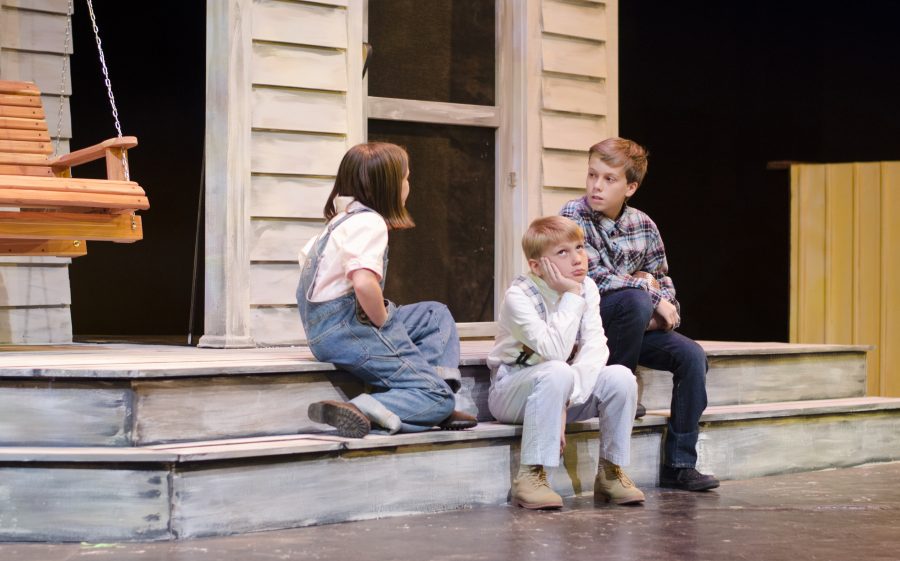There is a tension in the air at the Bean-Brown Theatre on Thursday night as the cast of “To Kill A Mockingbird” appear in full costume for a photo shoot. Actors discuss a strong desire to do right by one of the most important literary works to come out of Alabama. And with less than a week of rehearsals left, and ticket sales already high, the pressure is mounting for the performers of Theatre Tuscaloosa.
But this apprehension doesn’t translate onto the stage. As soon as actors step onto the boards, they start to exude their character. Jeff Wilson becomes a stately southern lawyer as Atticus Finch; Von Ewing embodies the kindness and dignity of Tom Robinson. The show premieres on Friday at 7:30 at Bean-Brown, and the actors seem excited and ready for the challenge they face.
“Everybody’s read the book, everybody knows somebody, and all the lawyers in Tuscaloosa will be here watching,” said Wilson.
Wilson has been acting for most of his life. He’s an alumni of The University of Alabama’s theatre department and has portrayed Atticus Finch on three occasions. He said that his Atticus is a little different than the famous rendition of the role performed by Gregory Peck.
“Mr. Peck was not a Southerner. I don’t think he really understood the Southern part of the show,” Wilson said. “I don’t think Harper Lee thought he did either. He was wonderful, don’t get me wrong, but there’s lots of stuff in here that there’s no way that man knew the background behind why things are the way they are.”
The actor calls the character a challenging one to play, but said that he has an inspiration for his version of Atticus. His wife’s grandfather was a small-town lawyer similar to the character. Wilson recalled people paying his grandfather-in-law for legal services with buckets of crab and fish.
Director Paul K. Looney is bringing “To Kill A Mockingbird” to the stage this year because of recent interest in the book, sparked by this year’s release of a sequel, “Go Set a Watchman.” He said that part of what makes the play unique is that it is a serious story told from the point of view of children.
“The whole story is told through the eyes of Scout and Jim and their friend Dill,” Looney said. “But it’s not a children’s story. It’s a very, very adult play, the subject matter is adult. The themes that you talk about are serious and sometimes difficult to see or to talk about.”
This adaption of “To Kill A Mockingbird” was penned by Christopher Sergel, a playwright chosen specifically by Harper Lee to take her novel to the stage. Because of this, Looney said the play was very close to the original work.
“Most of the play’s dialogue is taken straight out of the book,” Looney said. “The people who come will feel very at home with what they are seeing.”
Looney said that many of the themes in the work are still important in modern times.
“I don’t think this play could be more relevant than it is today,” said Looney. “Of course, the subject matter is really about race discrimination. And while we think that a lot of progress has been made in this state, you don’t have to go very far to listen to the news, to know that there are incredible inequities involving race.”
The director referred to incidents such as the recent church shooting in Charleston, South Carolina, and the widespread accusation of police brutality in the United States as racial issues that still trouble our society.
“We have to take a look at where we are in the year 2015,” said Clemmie Hilton, an actress who will play Calpurnia. “Have we made advances from 1935, the setting of this story? Of course, there are some very gruesome and ugly overtones that are presented, in this book, in this adaptation. So it causes us all as human beings to take a look at how we treat each other, and how we treat those who are of a different race.”
To put herself in the role of Calpurnia, a maid who acts as a mother figure to Jem and Scout, Clemmie said she reconnected with memories of her maternal grandmother.
“She actually was a woman who cooked and cleaned for white people. That was her job, and she also helped to rear their children,” Clemmie said. “She would share stories about how she was so endeared to those families because she was such a major part of their families.”
Clemmie said that she tried to play Calpurnia effectively and help present the themes and opinions of author Harper Lee.
“I can’t just look at my role, and say, well, I’m coming to stage to do my lines, and that’s it,” she said. “Everybody is so important. In order to grasp that, you actually have to step into the mind of the author and understand, what is she trying to get us to see here?”
In the penultimate week of rehearsals, Looney told me that the cast of his production was developing friendship and chemistry with one another, on stage and off.
“This has been a particularly close cast,” he said. “I’ve been very happy to be with everyone in the cast.”
Clemmie Hilton put it in a different way, comparing the director to a maestro conducting the actors as though they were an orchestra, and helping each actor do their best work. She described the synergy in a recent rehearsal as particularly strong.
“It was so symphonic,” she said. “We were working certain scenes over and over, and you could feel the vibration, how it was rising and we continued to perfect [our performances].”







